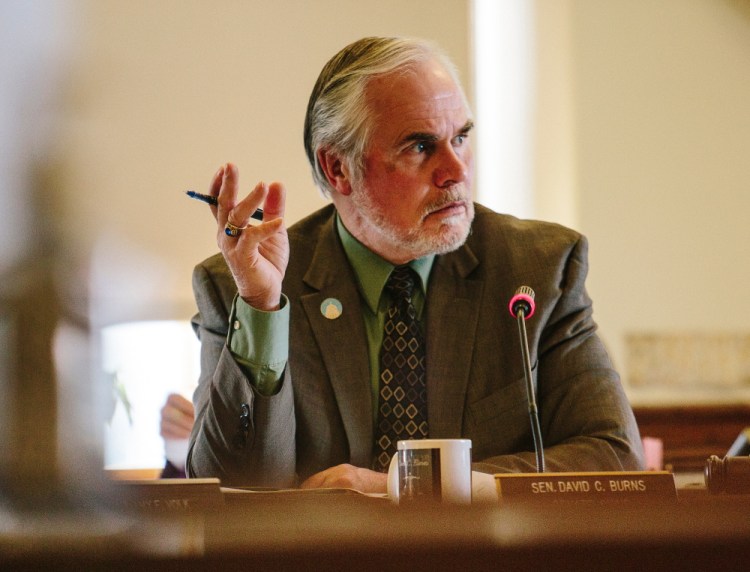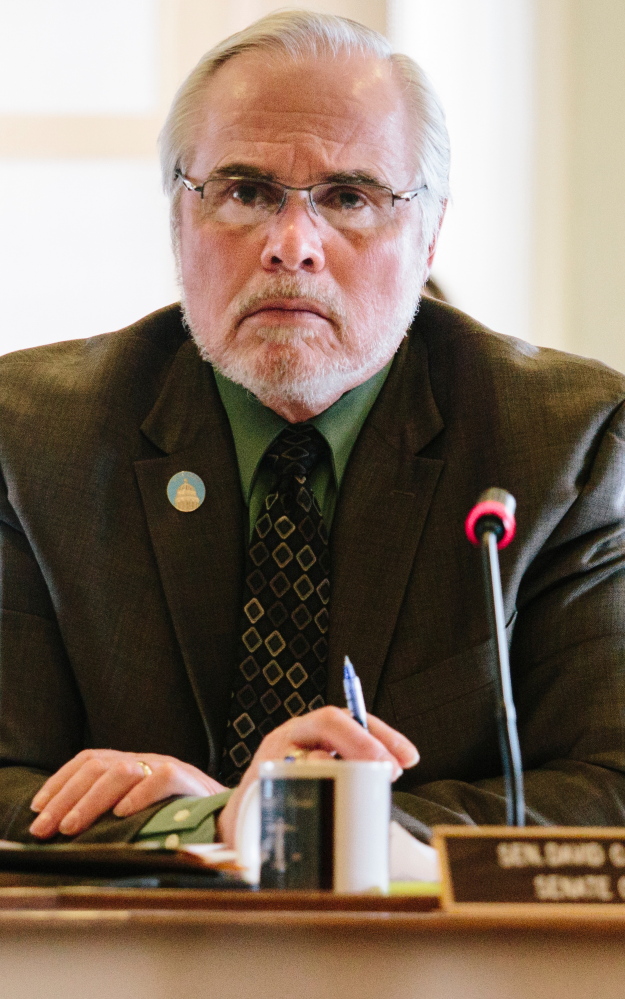AUGUSTA — A state senator said Thursday he will propose a bill similar to the so-called religious freedom laws that have generated a backlash and protests in Indiana and Arkansas.
While supporters say such legislation simply protects the right to put religious beliefs into practice, the bills have sparked widespread criticism from those who say they will allow people to ignore or break laws and discriminate under the guise of religious freedom.
Sen. David Burns, R-Whiting, said he’s moving forward with the proposal in Maine despite a national controversy that includes boycotts by gay-rights activists against Indiana businesses, sanctions by other states and even a call to move the NCAA Final Four basketball tournament from Indianapolis. Businesses, including Wal-Mart and Apple, also have urged states to reject the proposals.
Lawmakers in Indiana and Arkansas tried to quell the uproar by passing amendments Thursday to revise the legislation in their states. The Indiana amendment prohibits service providers from using the law as a legal defense for refusing to provide goods, services, facilities or accommodations.
Burns’ bill has not been printed and made public, but he said Thursday that his proposal will be similar to one he introduced last year that was defeated by the Democrat-controlled Legislature. That bill would have prohibited any state laws from infringing on a person’s exercise of religion unless that law constituted a “compelling state interest.”
The language of such bills in Maine and elsewhere has caused many to fear that the rights of a business owner to refuse to serve a same-sex couple based on religious belief, for example, might trump the couple’s right against discrimination.
At least 19 other states already have some version of a religious freedom law modeled after a 1993 federal law, the Religious Freedom Restoration Act.
However, the new wave of bills in Indiana and elsewhere has reignited the national debate over whether the laws grant special rights to religious groups and allow them to discriminate against others.
Activist groups argue that the resurgence of the religious freedom laws on the state level – there are at least 17 under consideration this year – are a response to marriage equality victories in recent years. Critics also argue that the new proposals, such as Indiana’s, are more expansive than the federal act because they explicitly recognize the rights of corporations and elevate the possibility that businesses could discriminate against gay couples.
Burns is aware of the controversy.
“I put it in last year, and I thought it should have passed last year,” he said. “I think it’s reasonable and I think it’s needed. Historically, as you’ve been hearing over and over again, there has not been any bad ramifications because of it (the federal act) in 20 years. I don’t know what the hoopla is all about. Well, I suspect I do.”
REACTION TO SAME-SEX MARRIAGE LAWS
Burns has not pointed to examples of Mainers being unable to practice their religions, but has said the law would affirm Mainers’ constitutional rights and bring the state into line with federal law.
Burns is a former Maine state trooper who served nearly 25 years before retiring in 1994. He is regarded as deeply devoted to the Christian faith and he has served on committees overseeing law enforcement, the judicial system, and government ethics and accountability.
Although Republicans now control the Senate, Democrats continue to control the House, so the bill’s passage appears unlikely again this year. However, the issue could put Republican leaders in a difficult position if the national controversy migrates here.
Senate President Michael Thibodeau endorsed the proposal in a prepared statement.
“I applaud Sen. Burns for his willingness to bring forward a bill that will result in thoughtful conversations about this issue,” Thibodeau said. “I can’t think of a better individual to guide this through the legislative process in a more dignified manner. I think this is an opportunity for all Maine lawmakers to be heard on this matter so we can craft a religious liberty bill that we can all be proud of.”
A spokeswoman for Gov. Paul LePage said the governor wasn’t ready to comment on the bill.
House Speaker Mark Eves, D-North Berwick, said in a prepared statement that legislators should reject Burns’ bill if it’s similar to Indiana’s proposal.
“Religion should never be used as a cloak to discriminate,” he said.
Burns said his bill will again be modeled after the Religious Freedom Restoration Act. That law was a response to a 1990 U.S. Supreme Court decision that faith organizations said unraveled key protections of the First Amendment by saying states no longer must prove that a law imposes a substantial burden on religious freedom. A later court decision left it up to states whether to adopt the federal standard.
The American Civil Liberties Union initially supported the 1993 federal law to protect religious freedom.
However, the ACLU now opposes the latest round of state-led efforts unless the laws include language ensuring that they will not allow discrimination.
Oamshri Amarasingham, a lawyer with the ACLU of Maine who argued against Burns’ bill last year, said the differences between the federal law and the newest state bills are subtle in language, but impactful in consequence.
For example, the federal law doesn’t define a “person,” but Indiana’s law does and includes individuals, churches and private companies. And the federal law states that a person can sue the government for religious discrimination, but the Indiana law says it doesn’t matter if the government is involved.
Amarasingham said Burns’ bill would undercut Maine’s landmark law that prohibits discrimination based on sexual orientation. The law was ratified by voters in 2005.
Elise Johansen, executive director of EqualityMaine, said it was no coincidence that the resurgence of religious freedom bills came as more states and courts legalize same-sex marriage or repeal bans on the unions.
“As a community, we’ve seen some really great progress,” she said. “I think any attempt to undermine a right or protection for any group of people is harmful and really dangerous.”
PASSIONATE DEBATE ON HORIZON
In addition to Maine, 16 states have introduced religious freedom bills this year, according to the National Conference of State Legislatures. In some instances, states that adopted religious freedom laws several years ago are considering initiatives to strengthen the existing laws.
At least 14 of the 17 states considering the initiatives are states in which same-sex marriage has been made legal in the last three years, either through referendum or a court action overturning a ban. Maine voters legalized same-sex marriage in 2012.
Johansen said she expects strong opposition to Burns’ bill when it undergoes a public hearing.
“I hope that people, after seeing this is being attempted in Maine, will make a stand as residents and as business owners and say that this can’t happen in Maine,” she said. “We’re a state full of fair-minded, compassionate humans and we already have a right to religious freedom protected in our Constitution.”
Burns will have supporters in Maine.
On Wednesday, the Christian Civic League promoted an appeal from Tony Perkins of the Family Research Council, urging supporters to defend the Indiana law and back Gov. Mike Pence.
“We can’t take for granted our freedom of religion; the freedom to believe and to live according to those beliefs,” Perkins wrote. “Given to us by God, and recognized by the First Amendment to the U.S. Constitution, religious freedom is crucial to the life of our democracy. If the government punishes people for living their faith, there are no limits to what government can control.”
Not all religious groups endorse religious freedom proposals.
Bishop Stephen T. Lane, Episcopal bishop of Maine, said in a written statement that lawmakers should reject Burns’ bill if it’s similar to his proposal from last year.
“As people of faith, we respect the dignity of every human being and will fight against any statute that would allow Mainers to discriminate against their neighbors in the name of religious freedom,” he said. “Among religious and Christian denominations the notion of religious freedom, as lived out in civic life, is widely interpreted. For us, as Episcopalians, that constitutionally guaranteed freedom can never be exercised to impinge on the rights of others.”
Send questions/comments to the editors.




Success. Please wait for the page to reload. If the page does not reload within 5 seconds, please refresh the page.
Enter your email and password to access comments.
Hi, to comment on stories you must . This profile is in addition to your subscription and website login.
Already have a commenting profile? .
Invalid username/password.
Please check your email to confirm and complete your registration.
Only subscribers are eligible to post comments. Please subscribe or login first for digital access. Here’s why.
Use the form below to reset your password. When you've submitted your account email, we will send an email with a reset code.